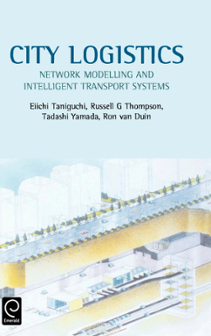
Prelims
Citation
Taniguchi, E., Thompson, R.G., Yamada, T. and van Duin, R. (2001), "Prelims", City Logistics, Emerald Group Publishing Limited, Leeds, p. i. https://doi.org/10.1108/9780585473840-010
Publisher
:Emerald Group Publishing Limited
Copyright © 2001 Emerald Group Publishing Limited
Prelims
Half Title Page
City Logistics
Related books
BELL (ed.)
Transportation Networks: Recent Methodological Advances
BREWER, BUTTON AND HENSHER (eds.)
Handbook of Logistics and Supply-Chain Management
CEDER (ed.)
Transportation and Traffic Theory: Proceedings of the 14th International Symposium on Transportation and Traffic Theory
TILANUS (ed.)
Information Systems in Logistics and Transportation
Title Page
CITY LOGISTICS
NETWORK MODELLING AND INTELLIGENT TRANSPORT SYSTEMS
EIICHI TANIGUCHI
Kyoto University
RUSSELL G THOMPSON
University of Melbourne
TADASHI YAMADA
Kansai University
RON VAN DUIN
Delft University of Technology

United Kingdom – North America – Japan
India – Malaysia – China
Copyright Page
Emerald Group Publishing Limited
Howard House, Wagon Lane, Bingley BD16 1WA, UK
First edition 2001
Copyright © 2001 Emerald Group Publishing Limited
No part of this book may be reproduced, stored in a retrieval system, transmitted in any form or by any means electronic, mechanical, photocopying, recording or otherwise without either the prior written permission of the publisher or a licence permitting restricted copying issued in the UK by The Copyright Licensing Agency and in the USA by The Copyright Clearance Center. No responsibility is accepted for the accuracy of information contained in the text, illustrations or advertisements. The opinions expressed in these chapters are not necessarily those of the Editor or the publisher.
British Library Cataloguing in Publication Data
A catalogue record for this book is available from the British Library
ISBN: 978-0-58-547384-0


Preface
It is well recognised that urban freight transport plays a vital role in the sustainable development of cities. However, urban freight transport recently faces many challenging problems, including high levels of traffic congestion, negative environmental impacts, high energy consumption and a shortage of labour. Within these difficult conditions freight carriers are also requested to provide higher levels of service with lower costs.
In response to these problems a new area of transport planning has emerged called City Logistics. City Logistics is the process of totally optimising urban logistics activities by considering the social, environmental, economic, financial and energy impacts of urban freight movement.
This book presents the basic concepts and approaches of City Logistics. In particular, it focuses on modelling City Logistics. Modelling is very important, since the estimation and evaluation of the impacts generated by City Logistics measures is required before implementing them. The book mainly deals with network modelling including, vehicle routing and scheduling models with time windows, location models of logistics terminals and impact models of City Logistics measures.
Recent developments in the field of Intelligent Transportation Systems (ITS) can facilitate the implementation of many City Logistics initiatives. Currently, advanced telecommunication systems provide powerful tools for efficiently operating vehicle fleets. Sophisticated logistics systems can now be developed by integrating Global Positioning Systems (GPS) and Geographical Information Systems (GIS) in conjunction with application software. Therefore, ITS based City Logistics has become more realistic in many industrialised countries. In this context, we present a theoretical and practical treatment of modelling City Logistics based on ITS.
City Logistics provides an opportunity for innovative solutions to be developed for improving the quality of life in urban areas. The modelling approaches described in this book are relatively new and are not yet commonly used in city planning. Although, several cities have already implemented some City Logistics initiatives, there currently are a limited number of evaluation tools that have been developed for predicting the consequences of such schemes. However, the models described in this book should provide useful tools for researchers and city planners for evaluating City Logistics policies or measures to help solve urban freight problems.
This book was initially planned to be a textbook for a graduate course on City Logistics.
However, the authors believe that it will be also beneficial for city planners and logistics managers in industry as well as students. The first author of this book initiated a graduate course on City Logistics at Kyoto University, Japan in 1995. He thought that it was necessary to publish a textbook on the subject to disseminate the concepts of City Logistics not only to students but also to city planners.
The four authors have previously conducted collaborative research in the area of City Logistics, much of which is contained in this book. They organised the First International Conference on City Logistics at Cairns, Australia in 1999 and published the proceedings, City Logistics I. They are also active members of the Institute for City Logistics (http://www.citylogistics.org), which provides a scientific platform for research and development related to City Logistics and urban freight issues. Therefore, this book is really a collaborative product of the four authors.
This book is composed of nine chapters, with each author making a major contribution to a number of chapters:
E. Taniguchi: Chapters 1, 5, 6 and Section 7.3
R.G. Thompson: Chapters 2, 3, 7 and Section 1.7
T. Yamada: Chapters 4 and 8
J.H.R. van Duin: Chapter 9 and Section 2.7
The authors would like to express their heartiest appreciation to the valuable advice to the researches by Professor Y. Iida of Kyoto University, Japan and Professor R.E.C.M. van der Heijden of Delft University of Technology, The Netherlands.
August 2000
Eiichi Taniguchi
Russell G. Thompson
Tadashi Yamada
J.H. Ron van Duin